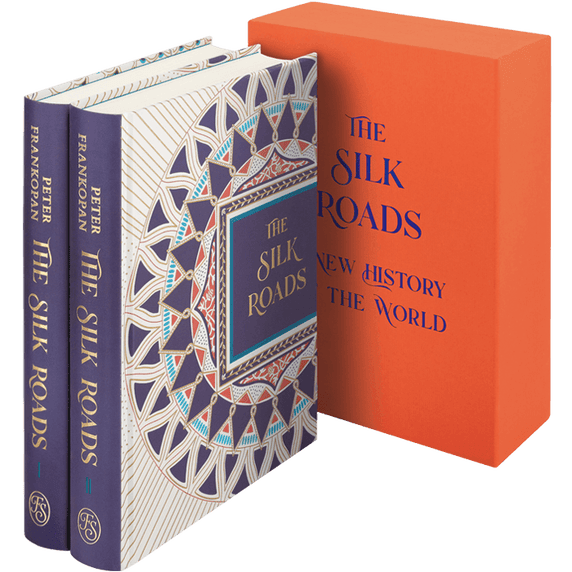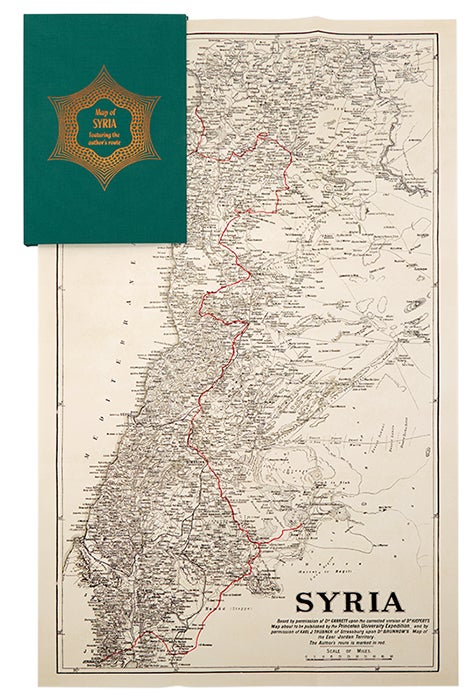
The Silk Roads
The Silk Roads is Peter Frankopan’s revolutionary world history told from the perspective of the East: a beautiful, illustrated Folio edition of an international bestseller.
The Desert and the Sown
Introduced by Professor Dawn Chatty
Illustrated with the author’s original photographs
Syria: The Desert and The Sown is a masterpiece of travel writing by Gertrude Bell, a pioneering Victorian explorer of Arabia, now available in a stunning Folio edition featuring her original photography.
‘Bell bestowed her attention upon persons rather than places, her chief concern being to study the character and customs of the people. This fact sharply differentiates her work from most books on travel.’
- New York Times
Very little about Gertrude Bell could be considered ordinary. Known as the ‘female Lawrence of Arabia’, she was not only an explorer but an expert linguist, mountaineer, archaeologist, spy and nation-builder, who helped draw the borders of modern Iraq and establish the Hashemite dynasty. Syria: The Desert and the Sown is her celebrated account of a 1905 journey through Ottoman Syria, an area that now includes parts of modern Palestine and Israel, Syria and Lebanon. She describes the heavy Ottoman presence in Arab towns and cities (the ‘sown’ areas) but their absence from the desert, where Bedouin tribes remained effective rulers, and her portraits of Syria’s people leap from the page, from haughty sheikh to lowly servant. This edition includes more than 160 of Bell’s own photographs newly sourced from her archive, from abandoned forts and camel caravans to daily life in the bazaar. A vast fold-out map of her route, in its own cloth-bound case, traces her journey from Jerusalem to Antioch via Palmyra, Baalbek and the Krak des Chevaliers. With a new introduction by Oxford anthropologist Dawn Chatty, The Desert and the Sown is a timely read about a now-troubled region, made by one who influenced its destiny.
Bound in blocked cloth with a design by Yehrin Tong
Set in Garamond with Scrivano as display
336 pages
Colour frontispiece plus over 160 integrated black & white photographs
Fold-out map presented in a case, bound in blocked cloth
Plain slipcase
10˝ x 6¾˝
This exquisite edition does full justice to Gertrude Bell's pioneering text. For the illustrations, new prints of more than 160 of her photographs were taken from the negatives held at Newcastle University – an archive listed in the UNESCO Memory of the World Register for its significance. The stunning geometric designs on the cover and map casing are the work of Yehrin Tong, two-time winner of the V&A Book Cover Illustration Award, and the frontispiece reproduces John Singer Sargent’s striking watercolour of two Bedouins. The new introduction by Dawn Chatty, Professor of Anthropology and Forced Migration at the University of Oxford, provides a biography of Bell’s extraordinary life and achievements, concluding: ‘For anyone who has visited Syria or only read about it, this book will deepen their understanding of its past, and help elucidate their understanding of its present.’
‘Few such moments of exhilaration can come as that which stands at the threshold of wild travel. The gates of the enclosed garden are thrown open, the chain at the entrance of the sanctuary is lowered, with a wary glance to right and left you step forth, and, behold! the immeasurable world.’
- Gertrude Bell
Gertrude Bell was not only among the first Western women to travel solo in Northern Arabia, but the first woman to graduate in Modern History at Oxford, receive a prize from the Royal Geographical Society and become a British military intelligence officer. She was a famed mountaineer, once spending 50 hours roped to the side of a mountain in a blizzard, and a peak in the Swiss Alps (the Gertrudspitze) is named in her honour. Yet for all her many achievements, it is Bell’s affinity with people from all stations in life that makes Syria: The Desert and the Sown such a captivating read. Whether in fireside discussion with Arab tribesmen in a cave, exchanging diplomatic civilities with Nāzim Pasha, the Ottoman governor of Syria, or conversing with Mikhāil – her long-suffering, bibulous cook – Bell ‘draws out the common humanity of all she meets’.

